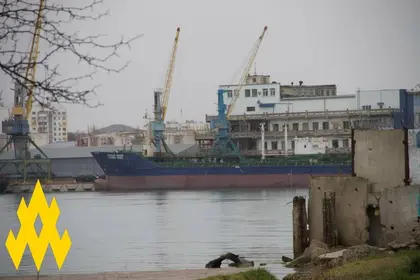The Atesh guerrilla movement, via Telegram, reported Russia’s deployment of S-300 air-defense missile systems and Pantsir-S1 anti-aircraft artillery systems to safeguard the Kerch Bridge against potential Ukrainian attacks.
“Our agents are vigilantly monitoring the Kerch Bridge area,” read the caption accompanying the photos and footage released by the partisans.
JOIN US ON TELEGRAM
Follow our coverage of the war on the @Kyivpost_official.
A source within the partisan movement, speaking exclusively to Kyiv Post, mentioned that “the Russians are concentrating a significant amount of their air defense in Crimea and on the border areas, stripping cover from Russian regions.”
During their surveillance, the guerrillas observed Russia utilizing civilian vessels for military cargo transport.
“We’ve also noticed a decrease in the movement of Russian Navy warships,” the partisans said.
Agents of Atesh also documented the transfer of air defense equipment to shield the bridge from potential air assaults by the Ukrainian Defense Forces. The report mentioned the presence of S-300 and Pantsir-S1 complexes.
The Pantsir missile system, a self-propelled surface-to-air missile and anti-aircraft artillery system, serves to protect military, industrial, and administrative installations from various airborne threats. It offers defense against aircraft, helicopters, precision munitions, cruise missiles, and UAVs, particularly at low altitudes.

Russian Military Column Spotted Heading to Zaporizhzhia from Crimea - Partisans
According to open sources, the unit cost of the Pantsir missile system ranges from $13.15 million to $14.67 million in export markets.
The S-300, a Soviet medium-range anti-aircraft missile system, is designed to counter strategic and tactical aircraft, cruise missiles, and ballistic missiles at altitudes from 25 m to 27 km, with ranges of up to 100 km. The system boasts resistance to electronic countermeasures.
When grouped together, S-300 systems effectively defend extensive areas from airborne threats, earning recognition as one of Russia’s formidable anti-aircraft missile systems.
The strategic focus of the Russians, as revealed by the partisans, is evident in their actions aimed at fortifying the bridge’s air defense at the expense of protecting Russian cities.
Partisans have also documented a rise in air defense equipment on the occupied peninsula. Their data reveals that anti-aircraft missile complexes, “clearly unmasked,” have been newly stationed at the airport in the city of Dzhankoy.
The head of the Russian combat squad at the airfield, according to Atesh, repeatedly requested camouflage nets but received no response.
Partisans highlighted the Russian command's efforts to secure critical infrastructure, noting that “air defense assets are critically insufficient.”
Atesh agents, infiltrating the Crimean Air Defense Division, plan to intensify monitoring of anti-aircraft defenses on the peninsula.
Additionally, partisans continue to track Russian equipment movements. Atesh agents documented equipment transfers from Azovske to Dzhankoy and shared corresponding photos.
“As later revealed, this equipment is headed towards the Kherson direction to offset losses from Ukrainian FPV drone strikes,” the report said.
In a comment to Kyiv Post, a Ukrainian military officer, upon reviewing the equipment photos released by Atesh, suggested that the Russians had transferred the Proryv tank and the Infantry Fighting Vehicle-2.
He speculated that this military equipment might have been taken to repair facilities.
“For example, the tank is missing its gun. It appears to be a damaged piece of equipment, with the turret showing signs of chips, scratches, and used dynamic protection,” the Ukrainian military officer told Kyiv Post.
“It seems likely that this equipment was taken to repair plants,” he added.
Atesh disclosed that their agents from the “Dnipro” troop group provided insight into Russian army equipment losses, particularly in lightly armored vehicles, due to a shortage of operational combat-ready equipment.
You can also highlight the text and press Ctrl + Enter









